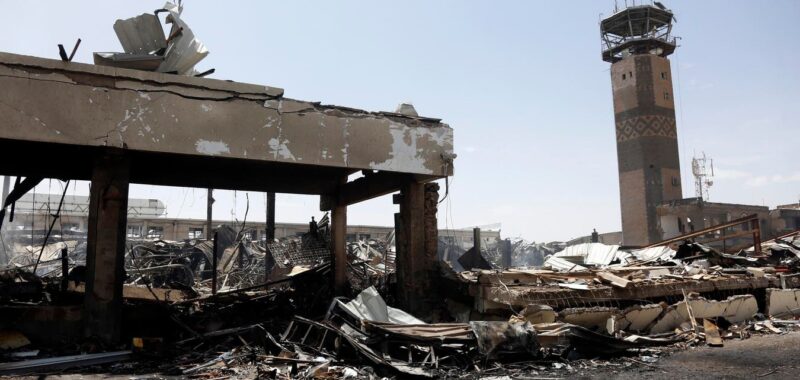A view shows destruction on the Sana’a International Airport a day after it was targeted by aerial … More
Mere hours after Israel retaliated to a Houthi missile strike on its main airport with airstrikes in Yemen, President Donald Trump announced a surprise ceasefire with the group, halting a two-month American air campaign. The move could leave Israel essentially alone when it comes to retaliating against the occasional Houthi missile and drone attacks that manage to evade or get through its sophisticated air defenses.
Trump announced a halt to the US anti-Houthi air campaign, codenamed Operation Rough Rider, “effective immediately” on Tuesday. The president said the Houthis agreed to stop attacking shipping in the Red Sea. Oman confirmed it mediated the ceasefire shortly after. Saudi Arabia also lobbied for a truce before Trump’s May 13-16 visit to the region.
Mohammed Al-Basha of the Basha Report, a Virginia-based Risk Advisory, believes the best way to understand this development is “through the lens” of Trump’s America First foreign policy.
“The United States is no longer engaging in endless wars or fighting on behalf of others,” Al-Basha told me. “That said, Washington remains committed to the defense of its partners—whether it’s Israel, Saudi Arabia, Qatar, the UAE, or other Gulf allies.”
The Houthi leadership declared the ceasefire “does not include Israel in any way, shape or form.”
The group began targeting commercial ships and Israel shortly after the current war in Gaza began in October 2023. The US Navy was deployed to defend civilian ships and later target the Houthis with airstrikes. Trump launched Rough Rider in mid-March.
“To put current events in context, US military operations began after the Houthis directly targeted US naval vessels. The red line was crossed when American warships came under fire in 2024-2025,” Al-Basha said. “Carrier groups cannot safely transit from the Atlantic through the Mediterranean and into the Indian Ocean via the Red Sea while under threat from Houthi drones and missiles.”
Despite the intensified US airstrikes ordered by Trump, the Houthis were still able to launch a ballistic missile that hit the grounds of Israel’s Ben Gurion International Airport on May 4. Israel retaliated with heavy long-range airstrikes targeting Yemen’s Houthi-held capital, Sana’a, and the port of Hodeidah. Then Trump announced the ceasefire.
Ryan Bohl, a senior Middle East and North Africa analyst at the risk intelligence company RANE, believes that ongoing US-Iran nuclear talks likely influenced the ceasefire rather than any “breakthrough in US-Houthi relations or a sudden military defeat” for either side. (Trump claimed the Houthis “capitulated,” while the Houthis insist that the US “backed down.”)
“Seen in that context, its viability is also attached to the nuclear talks, which, if they fail, could presage a return to Houthi attacks on the US in the Red Sea,” Bohl told me.
Israel first retaliated against the Houthis last July following a deadly drone strike against Tel Aviv. The US asked Israel not to attack the Houthis in March shortly after launching Rough Rider, urging the Israelis: “Leave it to us.” With the current ceasefire, that’s no longer the case. “Israel will defend itself by itself,” said Israeli Prime Minister Benjamin in a social media video posted on Wednesday. “If others join us—our American friends—all the better. If they don’t, we will defend ourselves on our own.”
It’s likely the US military will continue intercepting Houthi missiles and drones launched at Israel wherever possible. However, the US is less likely to risk breaking the ceasefire by directly helping Israel strike the group in retaliation for future attacks.
“Continuing an expensive, open-ended bombing campaign with limited impact doesn’t align with US strategic goals,” Al-Basha said. “Instead, America will rely on its regional air defense network to intercept incoming threats.”
“The Houthis are unlikely to retaliate simply for defensive intercepts, but a fragile ceasefire could collapse if the US resumes offensive strikes—or if the Houthis resume attacks on US or US-linked vessels.”
Reverting to a defensive posture reflects the Trump administration’s intent to avoid regime change, occupation, or a costly ground war in the volatile region.
“The goal is to degrade capabilities, not to topple the Houthis. And according to CENTCOM, missile and drone launch rates have dropped significantly,” Al-Basha said. “Houthi leadership has gone underground, and they’ve acknowledged heavy losses—both in personnel and infrastructure.”
Reuters reported that the US strikes reduced the number of missiles and drones the Houthis could launch and eliminated significant numbers of its mid-tier fighters.
RANE’s Bohl believes the ceasefire makes the Houthis “an Israeli problem” for now.
“The Israelis will have to recalibrate their tactics in Yemen and possibly consider ways to deter Iran from continuing to support those attacks, which suggests that Israel may yet again escalate against Iran, either in Yemen, the Red Sea, or even in Iran itself,” Bohl said.
“Washington is now asserting its America First approach to Yemen and outsourcing the war to the Israelis, content to become a bystander, at least in the near term.”

